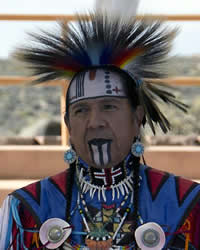The Upland Yuman people are a group of Native American tribes who speak mutually intelligible dialects of the Havasupai-Hualapai-Yavapai language, part of the Yuman–Cochimí language family, which itself belongs to the proposed Hokan linguistic phylum. Historically, they lived in northwestern and central Arizona, particularly near the Grand Canyon, and include the Hualapai, Havasupai, and Yavapai tribes.
These tribes traditionally practiced hunting, gathering, and seasonal farming, with the Havasupai developing irrigated agriculture in Cataract Canyon. The Upland Yumans were known for their dispersed settlements, loose political organization, and rich oral traditions, including song narratives used in rituals and ceremonies.
Upland Yuman communities often reside on reservations in Arizona, including areas like Peach Springs, Supai, and Prescott. Many live in rural settings, maintaining ties to traditional lands and practices. Their lifestyle blends subsistence farming, craftwork, and tourism, especially among the Havasupai, who are known as guardians of the Grand Canyon.
Social structures are based on kinship networks and local bands, with leadership roles often held by respected elders. Economic challenges persist, and many communities face poverty, limited access to healthcare, and educational barriers.
Traditional Upland Yuman religion centers on belief in a supreme creator, faith in dreams, and the use of song narratives in rituals. Water and nature are considered sacred, and oral traditions often include serpent deities and spiritual guardians of natural resources.
Christianity has made inroads, with about two-thirds identifying as Christian, most of whom are Evangelical. However, many still retain indigenous spiritual practices, and syncretism is common in religious expression. They view these practices as a way to hold onto a suppressed culture.
Access to culturally sensitive discipleship is essential to deepen biblical understanding while honoring traditional identity. Opportunities for economic development, including sustainable tourism and craft-based enterprises, are vital for community stability. Improved healthcare infrastructure is necessary to address chronic health issues and geographic isolation. Educational programs that incorporate native language and culture are important for preserving heritage and empowering youth. Resources for Bible translation and audio Scripture in native dialects are needed to support spiritual growth. Advocacy for land rights and environmental protection is crucial to safeguard ancestral territories.
Pray for a movement of spiritual renewal among Upland Yuman Christians, that faith in Christ would flourish and deepen.
Ask God to raise up local leaders and elders who can disciple others in culturally relevant ways.
Pray for healing and restoration in families affected by poverty, displacement, and cultural erosion.
Intercede for the younger generation, that they may remain rooted in Christ, put their identity in him, and become agents of transformation.
Pray that soon many from this tribe will become Christ's ambassadors to others who don't yet know the only Savior.
Scripture Prayers for the Upland Yuman in United States.
Britannica – Yuman History and Culture
New World Encyclopedia – Yuman Tribes
Museum of Northern Arizona – Havasupai
JSTOR – Sacred Water in Yuman Oral Tradition
| Profile Source: Joshua Project |










